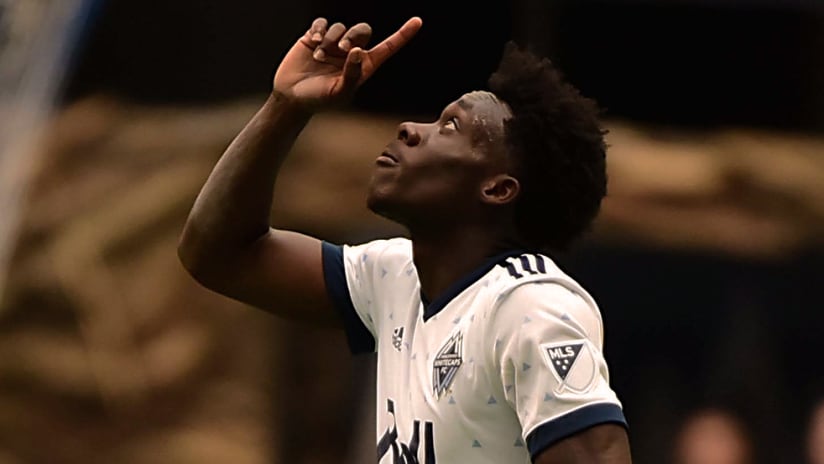In the end, the end was all that mattered for the Vancouver Whitecaps. And the end was ugly. Really ugly.
Despite a third-place regular season finish and a 5-0 thrashing of San Jose in the Western Conference Knockout Round, Vancouver ended 2017 on a downright depressing note. They were bounced from the Conference Semifinals by Seattle in miserable fashion, sitting in deep blocks and failing to threaten the Sounders at all as they registered just one shot on goal – a tame effort late in Leg 2 – in the entire series.
It was an utterly uninspiring performance, as dour as any in recent playoff history. It created some serious angst in the Whitecaps fanbase, a feeling that wasn’t exactly ameliorated by the club scoring just 10 goals in their first 10 matches this year.
That malaise, so prevalent just a couple of months ago, now feels like a distant memory. Almost out of nowhere, the Whitecaps have transformed into an elite attacking outfit. They’ve scored 16 goals since beginning a six-game unbeaten streak on May 11, three more than any other team in MLS during that span. They’ve scored at least two goals in all those matches, tying a club record, and put five past Orlando their last time out.
“We’re playing with a freedom and having bit of fun at the moment,” head coach Carl Robinson told MLSsoccer.com on Thursday. “It’s really enjoyable to watch.”
He’s not wrong. The ‘Caps still rely primarily on the counterattack, but a formation tweak, the improved form of Yordy Reyna, Cristian Techera and Kei Kamara, and the continued development of teenage star Alphonso Davies have them playing some of the most exciting soccer in MLS.
Sensing a matchup advantage, Robinson moved Vancouver out of their familiar 4-2-3-1 and into an old-school 4-4-2 ahead of their May 5 game at Minnesota. The ‘Caps left the Twin Cities with a disappointing 1-0 loss after playing most of the match up a man, but Robinson liked what he saw in the new setup. He’s stuck with it ever since. It’s paid major dividends, with Kamara finishing efficiently up top, Reyna shining in a higher role and Techera and Davies taking full advantage on the wings. In their last five matches, the quartet have combined to score 12 of Vancouver’s 14 goals and have totaled seven assists.
“There’s a great little balance about them,” Robinson said of his attacking foursome. “They’re all, other than Kei, who’s obviously an experienced center forward, the other three I think are 25, 23 and 17. So we’re young in that area, we know that, but the boys are fun to watch. They’re explosive, they’re dynamic, they love to attack.”
Techera has taken his star turn, but it’s Reyna and Davies who have been the main difference makers in the club’s recent hot run. Reyna’s improved play has given Vancouver an ability to play in tight spaces in and around the area, something they were missing dearly at the start of the year.
Davies has always had the ability to skate past defenders (he’s second in the league with six fast breaks this season; the ‘Caps lead the league with 20), but he’s now showing an increased willingness to drive into the box. Unlike the beginning of the season, when he was perhaps a bit too eager to hit early crosses, the 17-year-old is now making a concerted effort to get deep into the area and then put the ball on a platter for his teammates. He terrorized Orlando with three assists on exactly those type of plays, and added a goal against the Lions en route to picking up MLS Player of the Week honors.
“If you look at last year or two years ago when he first came onto the scene at 15, we knew that he’s pretty strong and he’s got power and he can run from box to box, what he’s been lacking is probably the end product, the final ball,” said Robinson. “And we challenged him: if you’re going to play in those attacking areas, you need to score goals and create goals. And I think, certainly in the last couple of weeks, he’s managed to do that, as well as Techera and Yordy Reyna.”
Of course, it’s not all rainbows and unicorns in the Rain City. As the attack has taken off, the defense has taken a step back. After conceding just 14 times in their first 10 matches, Vancouver have given up 12 goals in their last six. Robinson has been concerned by his team’s individual and collective defending, though he expressed confidence that his relatively young backline will figure things out.
He also addressed his club’s plans for the summer transfer window, saying he’d like to add another piece to the club’s attack once the window opens on July 10. A big addition probably isn’t in the cards, however. Though they have an open Designated Player and international spot, Robinson said that any addition would likely have to be offset by a departure of a player currently on the roster.
“There’s a number of factors, internally more important than externally,” he said. “As it stands at the moment, we’ve got our roster, we’ll probably need to move someone out to bring someone in. But it also depends on if we’re moving someone out to bring the same type of player, a different type of player or a more high-profile player. As it probably stands at the moment, we’re probably looking at a one in, one out scenario, probably with the same resources that we have now. So, for example, if we moved a $100,000 player, we’re replacing him with a $100,000 player.”













